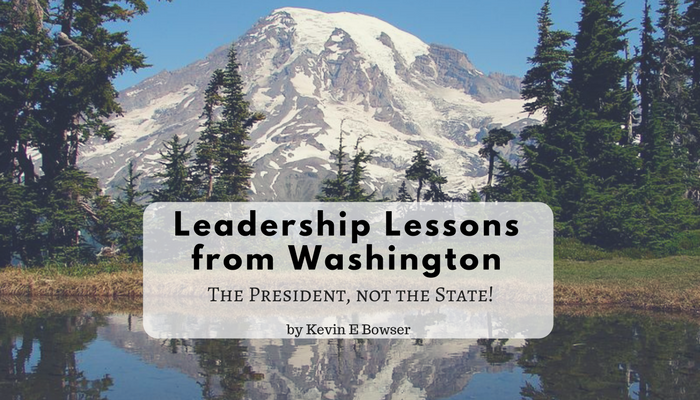I am enjoying a little respite from the hazy, hot, and humid Summer in Houston, TX. And my beloved bride found an inexpensive getaway to Oregon and Washington. Besides Lewis and Clark, we have seen a lot of profiles of George Washington’s face on many road and highway markers. And that reminded me of some thoughts I had a few years ago on leadership lessons we could learn from General, and later, President George Washington.
We, who live in the United States, have studied George Washington since first grade. We think we know a lot about him. But I am not sure that what we think we know is really historically accurate. I hope that there is more to George Washington than that silver dollar and that cherry tree.
Washington was many things. And most of all he was indeed a leader. He was the ideal man to lead the newly formed American Continental Army and then later to lead the newly formed United States as the nation’s first president. He developed his leadership skills from an early age and he had a distinguished military career. He further honed them as a businessman and entrepreneur. Those leadership skills and abilities made him the wealthiest man in America by many calculations. And his leadership was ultimately tested in his later military career as he took a rag-tag militia and forced the greatest military in the world into surrender. But his testing and trials were not over as the nation elected him to be the very first president.
What can we learn from George Washington?
What can we learn from Washington’s leadership style and skills? Several things come to mind for me today. Consider the following.
Washington understood the need to address the obvious. When he became the commander of the American Continental Army in 1775, his first General Orders forbade “cursing, swearing, and drunkenness.” He insisted that officers would direct their men to attend some form of religious service on a regular basis. I don’t think this was necessarily a Biblical directive. Rather, Washington understood the importance of moral training that leads to moral behavior and that good habits are conducive to good outcomes.
What can we learn? Address the obvious needs first. Don’t chase some obscure issue when there are obvious ones staring you in the face.
Washington understood the need to be practical. He was practical in his leadership. For instance, he instructed that latrines be installed for all soldiers to ensure a more sanitary environment. With many of the soldiers being from rural areas and being somewhat unsanitary about their habits, Washington saw the obvious threat to his soldiers’ well-being and he foresaw the potential impact upon his Army if a disease were to break out.
What can we learn? Be practical. Offer practical and necessary solutions. Don’t try to solve problems that don’t exist.
Washington understood the need to change when necessary. As a farmer, he amassed much of his early wealth through the growth of tobacco. However, when the price of tobacco dropped in 1766, he quickly adapted and went against the prevailing wisdom and converted much of his acreage to other crops such as corn, buckwheat, and other edible crops. And when other farms and plantations did not survive, Mount Vernon continued to prosper. Was it risky? Yes! But he calculated the risks and the rewards and made the decision to grow the less popular set of crops.
What can we learn? We need to be flexible. what has always succeeded in the past may not necessarily succeed today.
Washington understood the need to plan for contingencies. Smallpox was a killer in Washington’s day. While many simply waited to see if the disease would strike them, Washington took a different approach. When his troops amassed at Valley Forge, Washington ordered the inoculation of the troops as soon as they arrived. One historian has credited him with “the first large-scale, state-sponsored immunization campaign in American history.”
What can we learn? Be proactive. Try to prevent a problem before it becomes one.
Washington understood when it was time to go. John Adams succeeded Washington as the second president of the young republic. Washington remained a non-partisan leader. He demonstrated that by not being intimately involved in the selection of Adams as his vice president. And he did not enter the fray in selecting Adams as his successor. In fact, he had the good sense to stay out of the picture and not interfere. When the time came for Washington to go, he returned home to Mount Vernon to enter the next phase of his life.
What can we learn? Know when it is time to go and let someone else step up and lead. And when you go, go gracefully.
Do you understand?
Do you “understand” some of the same things that George Washington understood? Do you see the value in the traits that he exhibited? What traits would you like to work on? How do your leadership skills compare to the Father of our Country?
And aren’t you glad that we never had a president named Fred Oregon?




Please note: I reserve the right to delete comments that are offensive or off-topic.